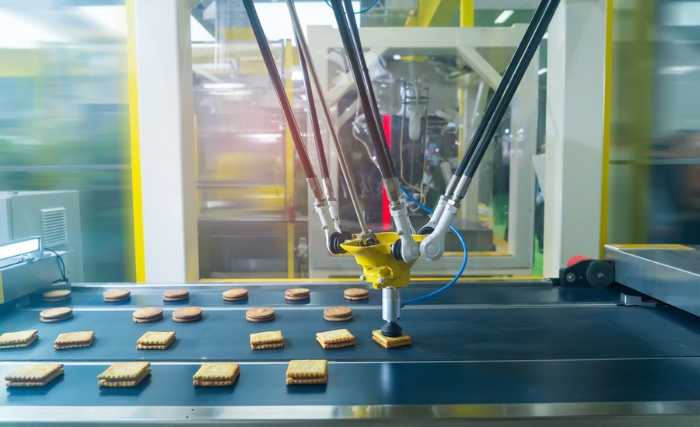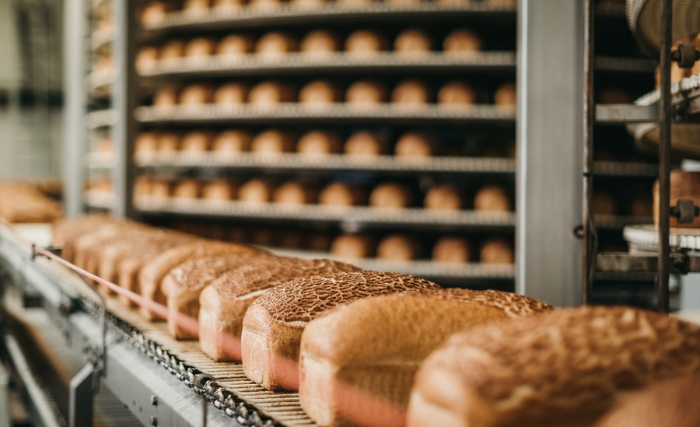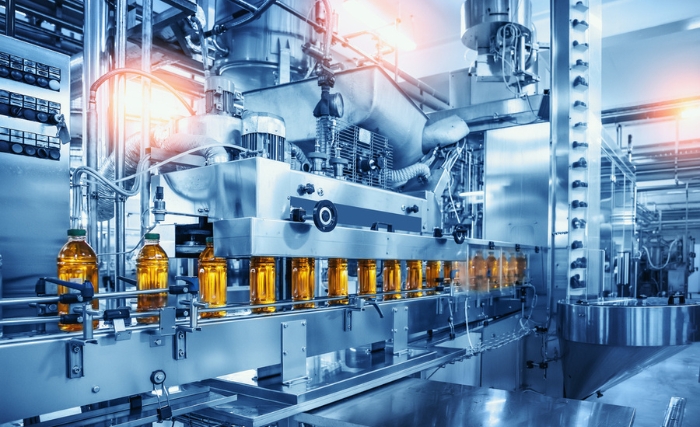
In recent years, the food industry has seen a significant shift in its production lines, paving the way for a new era of food and beverage processing and manufacturing. This transition has been greatly impacted by the transformative role of automation. So, how is automation revolutionising food production lines?
Automation, powered by advancements in robotics and AI technology, is fundamentally altering the landscape of food production. Not only is it streamlining operations, it’s also enhancing efficiency, reducing waste, and bringing about a sea change in the way we produce food.
The Role of Automation in Food Production
In the realm of food production, automation is primarily used to control and monitor production processes. This involves the use of advanced machinery and robotics that can carry out tasks ranging from ingredient sorting and mixing to cooking, packaging and labelling.
Automation in Bakeries
An excellent example of automation in action is its recent use in bakeries. Modern automated systems are now capable of handling everything from dough mixing to baking and packaging, with minimum human intervention. For instance, Fritsch, a German bakery technology company, has recently introduced a fully automated system that can produce up to 150,000 pieces every hour.

Meat Processing
Companies like JBT corporation have developed automated systems for tasks like deboning and slicing. These were traditionally done manually, which was labour-intensive and required a high level of precision. The new automated systems are able to carry out the same process more quickly and with greater accuracy.
Automated Beverage Production Lines
Krones, a leading manufacturer of filling and packaging technology, now offers automated solutions for beverage production lines. Their systems claim the ability to handle anything from bottle washing and filling to labelling and packing, significantly increasing throughput rates. This further demonstrates the ways in which automation is changing the food and beverage industry.
The Benefits of Automation in the Food Industry
One of the most significant ways automation is changing the industry is by addressing various challenges associated with food processing. As the demand for food products continues to rise, manufacturers are seeking innovative ways to increase efficiency, improve quality, and reduce costs. Automation presents a viable solution to these challenges.
Maintaining Hygiene Standards
In the realm of food processing, maintaining high hygiene standards can be a daunting task. However, automation has made it easier to uphold these standards and ensure food safety.
Robotic systems, for instance, are now being used to handle tasks such as cutting, sorting, and packaging, thereby reducing human interaction with food products. This minimises the risk of cross-contamination and ensures cleanliness, further displaying the transformative role of automation in food production lines.
Reduction of Food Waste
Food waste is another issue that automation effectively addresses. Traditional methods often lead to substantial waste due to inconsistent quality and unutilised raw materials. Through precision and consistency, automated processes significantly minimise this waste. They ensure exact portioning and packaging, preventing ingredient overuse, while consistent quality control reduces the number of rejected products.
Staff Shortages and Turnover
Automation allows food manufacturers to maintain production levels even with a reduced workforce. Advanced systems can also take over repetitive and strenuous tasks, reducing employee fatigue and enhancing workplace safety and satisfaction. This has led to noticeable productivity increases even with fewer employees.
Improved Scalability
Automation also enables scalability. Food manufacturers looking to expand their production capacity can do so efficiently through automation. Automated systems can be scaled up to meet higher production demands without a proportional increase in labour or space requirements. This adaptability makes food businesses nimbler and more responsive to change.
Innovation
Innovation is another critical benefit of automation. Advanced technologies like AI and machine learning are now being integrated into automated systems, enabling them to learn and improve their performance over time. This opens up possibilities for new product development and improved process organisation.
Quality Control
Automation has brought about substantial improvements in the realm of quality control within the food industry. By introducing a high level of precision in various processing stages, it has effectively minimised errors and inconsistencies that can compromise product quality.
Additionally, automated systems generate vast amounts of valuable data, providing insights into every aspect of the production process. This enables continuous improvement by identifying trends and potential issues before they escalate.

The Future of Automation in the Food Industry
As we look ahead, the benefits of automation in the food industry are set to become even more pronounced. The future of automation is promising and is expected to bring about remarkable transformations in the way food is processed, packaged, and distributed.
Increased Integration of AI
We can anticipate an increased integration of Artificial Intelligence (AI) and machine learning technologies into food processing systems. These technologies will enable machines to learn from their experiences, adapt to new situations, and improve their performance over time. This will likely result in greater efficiency, improved product quality, and reduced waste.
Smart Factories
Another trend to watch out for is the rise of smart factories or “Industry 4.0“. Smart factories could feature interconnected machines that communicate with each other, share data, and make decisions based on that data. It’s likely that this will enable a more agile and efficient production processes, leading to substantial cost savings and increased productivity.
Wider Use of Robotics
The use of robotics in food processing is also set to increase. Robots are becoming more sophisticated and capable of performing complex tasks with precision and consistency. As they become more affordable, even smaller food manufacturers may be able to budget to leverage the benefits of robotics.
Looking for Expert Food Production Consultancy?
With over 25 years of B2B food manufacturing consultancy, I’ve operated in a number of areas. From marketing and strategy to business development across EMEA and globally, I have gathered a wealth of expertise in the processing, weighing and packing of food and beverages.
You can find out more about how I’ve supported the food and beverages industry here. Alternatively, please get in touch for a more detailed


